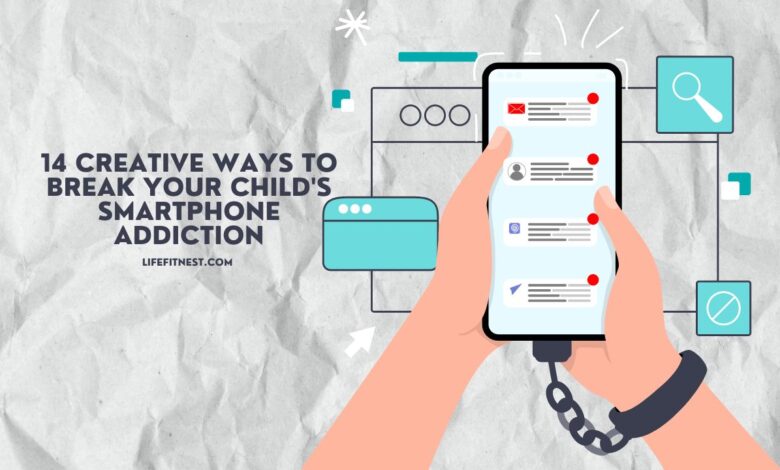14 Creative Ways to Break Your Child’s Smartphone Addiction

Know 14 creative ways by which you can keep your children away from smartphone addiction. In today’s online world, keeping children away from the screen is a big challenge for parents. However, media use is not without benefits.
Smartphones and tablets are becoming essential learning tools for children. Although the online world has many advantages, it is highly addictive and can have a negative impact on a child’s development. Irresponsible media use can lead to harmful behavior in children.
Adverse effects of smartphone Addiction
According to studies, teenagers spend approximately 9 hours per day in front of screens, while children (8-12) spend 6 hours. The effects of smartphones on children are negative. Here is a list of the side effects of excessive smartphone use in children:
- Behavioral problems
- Addiction
- Depression
- Sleep disturbances.
- Obesity
- Delay in Social Development
- Attention and hearing issues
- Nervous system problems
It is a difficult task to keep your children away from gadgets; it may cause withdrawal symptoms such as low appetite and temper tantrums.
Here are 14 innovative approaches to breaking your child’s smartphone addiction:
Break time: Children have a lot of energy, which should be used effectively. Make sure your children participate in physical activities on a regular basis. Every 30 minutes, take them for a short walk and stretch their muscles. Bodies require movement, and habits develop at a young age. Encourage them to stay active. It is critical to break up screen time and move around.
Prioritize other things: Before allowing your child to use a mobile device, ensure that they have completed their homework, studying, and housework. This helps to establish clear priorities from a young age.
Create a media plan: The most effective way to limit unrestricted media consumption is to develop a formal family media plan. This is a systematic approach to teaching your child how to use media responsibly from the start.
Do not use a smartphone as a reward or distraction: Smartphones have the potential to provide significant educational value to children. Total abstinence from it is not recommended. Moderation is the key here.Many parents use screen time to encourage their children to study, do homework, or do housework, but this can have more negative consequences than positive ones. Avoid using the smartphone as a distraction or reward for children, as this can have negative consequences.
Engage them in activity-based learning: Children use phones for recreational and entertainment purposes. Kids enjoy challenges. Mobile games are appealing because they provide challenges at each new level. Engaging children in activity-based learning allows them to learn while having fun.
Maintain a strict smartphone schedule: Setting aside adequate time allows parents to keep track of and limit the amount of time spent on gadgets, preventing unnecessary smartphone usage. By implementing a schedule, parents can improve their child’s habit of routine, preventing them from spending more time on screens. Smartphones have become an inseparable part of our lives, making it difficult to keep them away from children. As a result, make sure your child understands that he or she has only a limited amount of time to use your smartphone. Additional considerations:
Limit phone usage when your child is present.
No phones during mealtime.
Avoid watching TV or using phones before bedtime,
Resist your child’s unreasonable demands.
Bond with your child: These days, parents have very busy lives, and the time they have to spend with their children is limited. As a result, it is critical to schedule time for bonding activities with your children. Playing board games or involving your child in activities like cleaning, cooking, or gardening will keep her away from her smartphone. Encourage your child to develop hobbies such as listening to music, playing an instrument, reading, and painting. Spend your weekends engaging in enjoyable family activities such as swimming, playing games, and watching movies.
Active supervision: When children are deeply engaged in the online world, they pay little attention to their posture, screen brightness, and screen distance from their eyes. Active supervision is required to help the child maintain proper posture, while also providing an excellent opportunity to co-engage with your children while they use the screen. This promotes social interaction, bonding, and learning. Interact with them while monitoring to learn about their activities and assist them in overcoming any obstacles they may encounter.
Encourage play: Physical activity stimulates the brain. Physical activities allow children to expend energy while also developing gross and fine motor skills, learning new things, and socializing. It greatly improves a child’s physical and mental health.
Say no to technology as an emotional pacifier: Most parents use gadgets to distract their children while they feed, dress up, or travel. Yes, media can help keep children calm, but it should not be the only way to do so. It is the responsibility of parents to assist their children in identifying and managing strong emotions, devising boredom-busting activities, and engaging in open communication to resolve problems.
Encourage face-to-face communication: Research indicates that two-way communication with children improves language development far more effectively than passive listening or one-way interaction with a screen. To promote effective communication skills, parents should set aside time for face-to-face communication or video calls with distant parents and grandparents.
Communicate with your children: Humans are visual creatures. Children enjoy the vibrant colours and animations that appear on the smartphone screen. As a result, parents must educate their children about the health risks associated with mobile phone use. Show your children a variety of videos about the dangers of smartphone use.
Set passwords: Let’s face it, you can’t always be with your child and monitor them. In such cases, technology can help. To prevent your child from using your phone while you are not present, set a password on it.
Be an excellent role model: Children absorb more from your actions than your words. They are excellent observers and mimic their parents’ habits. It is critical to establish clear rules that must be followed. Restricting your smartphone usage allows you to spend more time with your child. These interactions with your child are critical in developing a strong parent-child relationship, the importance of which is frequently overlooked.
Many parents spend most of their time on their smartphones while instructing their children not to use them. In these cases, children must follow in their parents’ footsteps. Do what you preach. Limiting your smartphone usage will help you set a good example for your child. Spend more time interacting, hugging, and playing with your children rather than staring at a screen.
Must Read: 10 SUPERFOODS TO LOWER BLOOD SUGAR LEVELS
How to Protect Kids from Smartphones
Along with the methods mentioned above for keeping your child away from mobile phones, you can also take the following precautions to protect him from the harmful effects of mobile phone radiation.
Use a mobile phone with a low radiation level: As smartphones become more popular, it is best to purchase one with a low Specific Absorption Rate (SAR) value. The SAR value refers to the amount of radiation absorbed per kilogram of body tissue. To check the SAR value, dial *#07#. In India, the maximum permitted SAR level is 1.6 W/kg.
Avoid smartphone use while traveling: Keep your smartphone away from your child when traveling in a moving vehicle such as a car, bus, or train. A mobile phone in a moving vehicle continuously scans for a signal, emitting more radiation that is extremely harmful to children.
Conclusion
Smartphones, like all other devices, have both advantages and disadvantages. They can be both educational and detrimental. According to research, spending time in person with family, children, and friends has a significant impact on children’s healthy development. As adults, do not allow your child to become lost in a world of media and technology. Allowing your children to play with mobile devices and get some well-deserved rest is fine as long as they do not become addicted, use mobile phones responsibly, and strike a balance between real life and cell phone addiction.



